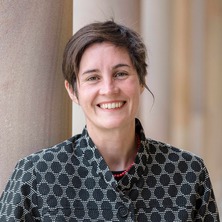Professor Felicity Meakins

Abstract: An Indigenous realignment of Linguistics in Australia
Australia has the dubious honour of having one of the highest rates of language loss worldwide. Prior to 1788, over 350 Indigenous languages were spoken. Now only 18 languages are still being learnt by children, however Indigenous languages have undergone an inspiring galvanisation over the last decade. International attention will be drawn to the current and future performance of Australia in the UNESCO Decade of Indigenous Languages (2022-2032). Indigenous languages are crucial to the cultural and socioeconomic well-being of Australia. The National Indigenous Languages Report (2020) details the benefits of learning Indigenous languages, and the National Agreement on Closing the Gap (2020) sets explicit targets for “a sustained number and strength of Aboriginal and Torres Strait Islander languages being spoken” over the next decade. The Queensland State Government’s Many Voices: Queensland Aboriginal and Torres Strait Islander Languages Policy (2020) also sets targets “to build community capacity to research and manage their language preservation, nurturing and maintenance”. A key barrier Indigenous language communities face in maintaining and reawakening languages is that there are not enough Indigenous researchers and educators that have the skill-sets necessary for supporting such efforts. This talk will outline initiatives underway at the University of Queensland to address the lack of pathways for Indigenous linguists and language practitioners. I will also point to a national initiative of the Indigenous Alliance for Linguistic Research, Centre of Excellence for the Dynamics of Language, Sydney Centre for Indigenous Research and the Research Unit for Indigenous Language, a new study group called ‘Decolonising Linguistics: Spinning a New Yarn’. This study group discusses topics of relevance to Indigenous communities involved in linguistic research and linguists more broadly, around framing a new ethical model for linguistic research based on a human rights agenda.
Bio:
Professor Felicity Meakins (ASSA) is an ARC Future Fellow in Linguistics at the University of Queensland and a CI in the ARC Centre of Excellence for the Dynamics of Language. She is a non-Indigenous field linguist who specialises in the documentation of First Nations languages in northern Australia and the effect of English on these languages. She has worked as a community linguist as well as an academic over the past 20 years, facilitating language revitalisation programs, consulting on Native Title claims and conducting research into First Nations languages. She has compiled a number of dictionaries and grammars, and has written numerous papers on language change in Australia.
